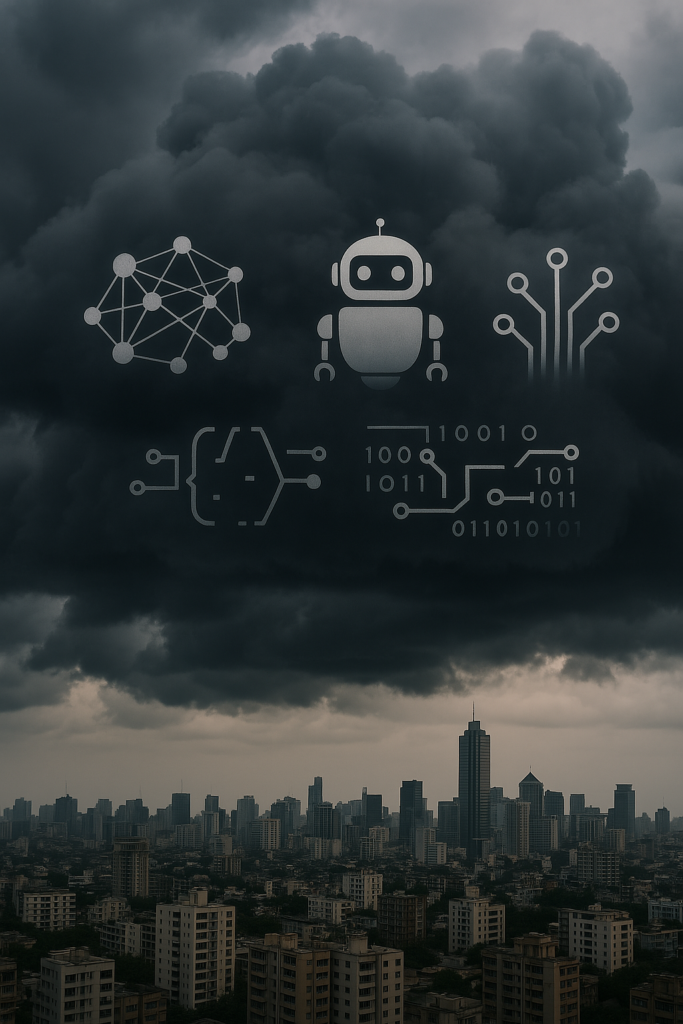
As the monsoon clouds loom over India, they bring both relief from extreme heat and a reminder of change. Similarly, a different kind of cloud—agentic artificial intelligence (AI)—is spreading across the global workplace, creating both opportunities and chaos.
The term “agentic AI” refers to advanced, decision-making AI systems capable of executing complex tasks with limited human oversight. Unlike traditional automation, this new breed of AI doesn’t just follow commands—it thinks, learns, and acts independently.
While Big Tech companies champion its rise, the social costs are becoming harder to ignore.
💻 What Is Agentic AI?
Agentic AI refers to systems that exhibit autonomy, goal-orientation, and adaptability. They are not simply tools but agents with a degree of operational freedom.
Examples of Agentic AI in Action:
- Customer service chatbots that resolve complex complaints without escalation.
- Financial AI advisors managing entire investment portfolios.
- Generative AI tools producing market-ready designs, music, and even legal contracts.
This level of functionality means fewer roles require human input, particularly in white-collar knowledge work.
🧢 The Rainmakers: Big 5 Tech and AI Optimism
Companies like Google, Microsoft, Meta, Amazon, and Apple are pouring billions into agentic AI development. Their narrative? These tools will:
- Eliminate repetitive tasks
- Enhance productivity
- Unlock new creative potential
While some of this is true, the broader labour market implications are murkier. For instance, a McKinsey 2025 report estimates that up to 25% of current job roles globally could be restructured or eliminated by agentic AI systems.
In India, sectors like IT services, BPO, journalism, design, and legal work are especially vulnerable.
📈 Job Loss, Identity Crisis & Hollowing Professions
Work isn’t just about income; it’s tied deeply to our sense of purpose, identity, and social contract. The arrival of agentic AI is unsettling this bond in several ways:
1. Displacement without Direction:
Unlike industrial automation, AI is not limited to factories or logistics. Even a junior analyst or designer can be replaced by a cheaper, 24/7 agentic system.
2. Erosion of Middle-Tier Roles:
These roles, once a stable ladder to upward mobility, are vanishing. The “hollowing out” of professions leaves a few high-paying jobs and many unstable gig roles.
3. Psychological Fallout:
Workers face “productivity paranoia,” imposter syndrome, and a constant fear of being outdone by machines.
“My AI assistant edits faster and better than I can. It makes me question my relevance,” said a content strategist from Bengaluru.
🪖 India-Specific Impact: Double-Edged Sword
India stands both to gain and lose from the rise of agentic AI:
Upsides:
- Tech talent export will grow as global companies hire Indian AI specialists.
- Startups leveraging AI to disrupt inefficient sectors.
Downsides:
- Mass job loss in IT-enabled services and BPO sector.
- Skill mismatch: The education system hasn’t caught up with AI needs.
- Urban-rural divide will widen as automation impacts Tier-1 jobs first.
A NASSCOM 2024 report indicated that over 30% of new engineering graduates remain unemployed, partly due to AI-driven redundancies.
⚡ The Evolving Social Contract
Historically, societies have had unwritten contracts: work hard, and you’ll have security and social mobility. Agentic AI is breaking this promise.
Who is responsible when humans are no longer needed at scale?
- Governments?
- Employers?
- The AI developers?
Without a new framework, we risk creating a society where meaningful work is scarce, and inequality grows unchecked.
🚀 Can Regulation Catch Up?
In India, regulatory frameworks are in early stages. The Digital India Act and National AI Mission are still evolving, and lack clear provisions on:
- Job displacement mitigation
- AI transparency & accountability
- Worker re-skilling mandates
Other countries are experimenting with robot taxes, universal basic income, and public AI access. India must explore similar tools—before the crisis hits full force.
🌧 The Path Forward: Resilience, Not Resistance
What Can Individuals Do?
- Upskill for AI-resilient roles like healthcare, AI ethics, design thinking, and green tech.
- Cultivate soft skills: empathy, storytelling, creativity, and emotional intelligence.
- Build hybrid careers that combine tech with human-centric fields.
What Can Policy Makers Do?
- Promote ethical AI development
- Fund vocational and tech retraining programs
- Create AI impact audits for all large firms
“AI will not replace you, but someone using AI might.” — Anonymous tech recruiter
🌧️ Final Thought: Cloudy With a Chance of Change
Agentic AI, like the monsoon, is inevitable. Whether it nourishes growth or washes away livelihoods depends on how we prepare and adapt.
The future of work isn’t just about machines—it’s about redesigning human relevance in an age of intelligent automation.









+ There are no comments
Add yours